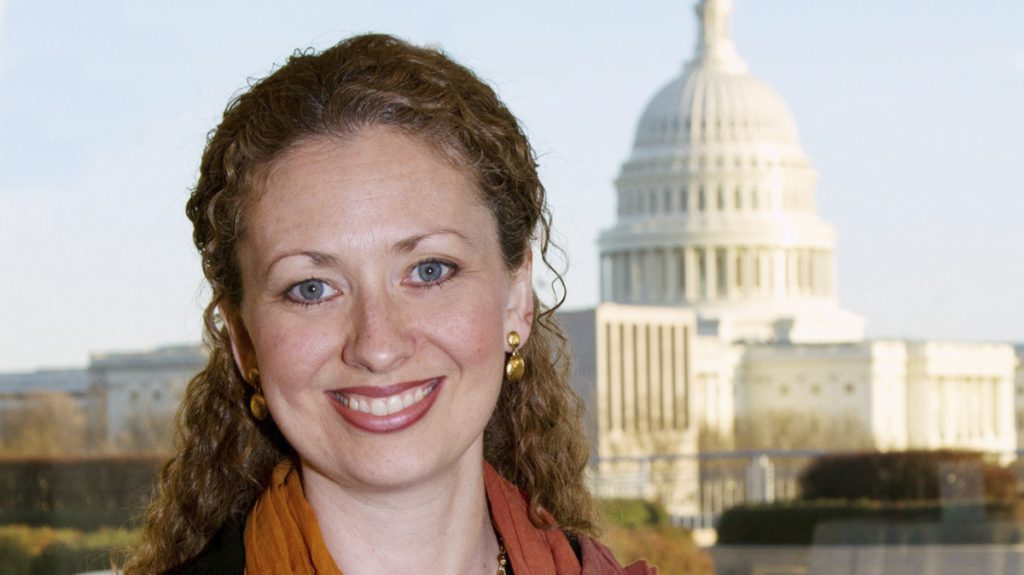Human rights issues aren’t limited to any gender, but the Tahirih Justice Center in Falls Church, Virginia, works specifically to help female immigrant survivors fleeing gender-based violence. Tahirih founder and attorney Layli Miller-Muro believes deeply in the power of spirituality to guide the achievement of human rights.
Miller-Muro will give her lecture, titled “Walking the Spiritual Path with Practical Feet: Operationalizing Human Dignity,” at 2 p.m. Tuesday, July 12, in the Hall of Philosophy.
“A journey that I’ve been on for my whole career is how to apply these spiritual principles with practical feet and how to operationalize them,” Miller-Muro said. “I’ve been doing that primarily in the context of women’s rights and race equality.”

At Tahirih, the human rights issues most commonly brought to them are: human trafficking, female genital mutilation or cutting, domestic violence, child and forced marriage, rape and sexual assault.
Miller-Muro said despite the lack of resources, Tahirih tries to counter overwhelming need by reflecting on stories of past survivors to motivate them. They provide victims with legal support as well as self-defense training.
“There’s a lot of joy that comes from seeing how their lives have been transformed,” Miller-Muro said. “What makes me most happy or satisfied about it is to see how they are in turn, change agents, and how then they go on to end the cycle (of violence).”
When it comes to human rights issues, intentionality plays a big part. Whether with positive or negative connotations, actions are almost always made with intent, Miller-Muro said.
She said she wants to discuss why people are so bad at treating others with dignity and respect.
“Reason No. 1 is we say it and we don’t believe it,” Miller-Muro said.
She said this can be seen most clearly in the documents written by the Founding Fathers; these documents say the founders believed in equality, but they didn’t actually mean it.
“What happens when you don’t believe (in respecting people), is you create exceptions in your mind and then put in systems or laws in treatment of people,” Miller-Muro said.
Categorizing or labeling people is the same as demonizing them, she said, and can lead to actions like separating mothers and children at the Mexican border.
“It makes it easy to put them in cages. It is because we’ve dehumanized (them), so it’s easy to do that,” Miller-Muro said. “Frankly, whether we’re talking about people at our border, whether we’re talking about races (or) religions, history has been unkind in its demonization and its attempted extermination of different people based on those labels.”
She said the majority of human rights violations stem from this preconceived notion of how we choose to treat others. Sometimes, she said, people know to treat others well, but they don’t know how. Or, on the opposite side of the spectrum, people don’t want to treat others well, so they don’t.
This leads to microaggressions. Miller-Muro said she lived in a very white community and intentionally moved because of the little things adding to discrimination and alienation.
In her new neighborhood, she was talking to a friend who was a mom of a child in the same school district as Miller-Muro’s children. Her friend lived in low-income housing, but the kids all went to the same school.
“She said, ‘In the three years my kids have gone to school here, they haven’t been invited to one birthday party, and whenever I pick up my kids, the mothers never speak to me,’ ” Miller-Muro said.
This led her friend to move her family to a lower-quality school district so she and her kids would feel comfortable and appreciated.
“It’s the little stuff … none of those mothers probably thought about it,” Miller-Muro said. “None of the kids who didn’t add them to their invite list probably thought about it. But her kids were Brown, her kids didn’t have the same clothes (and) they weren’t on the same soccer teams.”
Miller-Muro said these behaviors lead to a pattern of not being able to connect with people who are different from us, which then leads to alienation.
“Big human rights abuses come from really overt demonization and not believing the principle of ‘treat others as we should treat ourselves,’ ” Miller-Muro said.
She hopes to give her audience an understanding that all faiths and values teach the same core concept to treat people with kindness.
“There are things we can do to get (human kindness),” Miller-Muro said. “They involve structural changes to address grave human rights abuses, but they also involve small micro moments and tiny decisions every day that can add up to making the world a better place and treating each other with dignity.”




